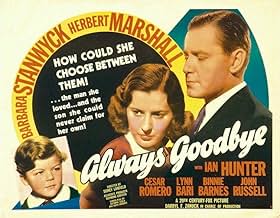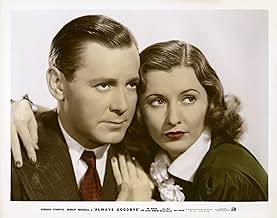A woman must decide between two men: one she loves, the other she admires and respects.A woman must decide between two men: one she loves, the other she admires and respects.A woman must decide between two men: one she loves, the other she admires and respects.
Johnny Russell
- Roddy Weston Marshall
- (as John Russell)
Carol Adams
- Hatcheck Girl
- (uncredited)
Rafael Alcayde
- Orchestra Leader
- (uncredited)
Bonnie Bannon
- Model
- (uncredited)
Katherine Block
- Masseuse
- (uncredited)
Eugene Borden
- Normandie Purser
- (uncredited)
Featured reviews
The thirties were a good time for melodrama,par excellence the female movie.In almost all the great melodramas of the era "Imitation of life" and " Only Yesterday" by Stahl or "Mannequin" by Borzage ,the woman realizes she's through with love and she becomes generally a brilliant business woman,be it in the pancakes ,the stock exchange or the chic fashion for selfish ladies who do not think twice when it comes to sending their soon-to-be adoptive child to a military school.
Routine situation in melodrama:Stanwyck's fiancé got run over and she is pregnant by him.In those ancient times,the only solution was to find a family where the child would be fine .But some fine day ,in old France,the mother meets again his little boy.Barbara Stanwyck gives a fine sensitive (and a bit mischievous:the way she gets rid of Jessica is delightful)portrayal .In the end, somehow or other, woman must be prepared to sacrifice something.That's the golden rule of melodrama.
Like this?try these
"The old maid " Edmund Goulding 1939
"To each his own" Mitchell Leisen 1946
Routine situation in melodrama:Stanwyck's fiancé got run over and she is pregnant by him.In those ancient times,the only solution was to find a family where the child would be fine .But some fine day ,in old France,the mother meets again his little boy.Barbara Stanwyck gives a fine sensitive (and a bit mischievous:the way she gets rid of Jessica is delightful)portrayal .In the end, somehow or other, woman must be prepared to sacrifice something.That's the golden rule of melodrama.
Like this?try these
"The old maid " Edmund Goulding 1939
"To each his own" Mitchell Leisen 1946
Barbara Stanwyck stars in this what was termed back in the day, a woman's picture. Always Goodbye is a remake of Ann Harding's Gallant Lady and it has Stanwyck giving up her infant son for adoption rather than trying to raise him as a single parent. That was simply not done back in the day of The Code.
Herbert Marshall arranges the adoption of the infant to his friend Ian Hunter and wife who have been childless for years. Marshall saved Stanwyck from doing herself in. He even arranges for her to get a job in the fashion industry working for Binnie Barnes. As you can imagine the latest in Thirties fashion is worn here. If this were done over at MGM Joan Crawford would have had this part for sure.
While on a buying trip to Paris, Barbara makes the acquaintance of Cesar Romero who provides a lot of the comedy in this film. He also gets a chance to show off his dancing ability which is considerable. Before films Romero was a dance instructor. She also runs into little Johnny Russell who turns out to be her son.
I think you can see where this is going and I will say while it's not the greatest of Stanwyck films it is certainly nicely done. Barbara's best scenes in the film are with little Master Russell. She doesn't let the kid steal them from her either.
In the end STanwyck has to make some critical choices. And finds out that you cannot always have your own way all the time.
Herbert Marshall arranges the adoption of the infant to his friend Ian Hunter and wife who have been childless for years. Marshall saved Stanwyck from doing herself in. He even arranges for her to get a job in the fashion industry working for Binnie Barnes. As you can imagine the latest in Thirties fashion is worn here. If this were done over at MGM Joan Crawford would have had this part for sure.
While on a buying trip to Paris, Barbara makes the acquaintance of Cesar Romero who provides a lot of the comedy in this film. He also gets a chance to show off his dancing ability which is considerable. Before films Romero was a dance instructor. She also runs into little Johnny Russell who turns out to be her son.
I think you can see where this is going and I will say while it's not the greatest of Stanwyck films it is certainly nicely done. Barbara's best scenes in the film are with little Master Russell. She doesn't let the kid steal them from her either.
In the end STanwyck has to make some critical choices. And finds out that you cannot always have your own way all the time.
A remake of the 1933 film Gallant Lady, directed by Gregory La Cava, starring Ann Harding and Clive Brook. Somebody must have thought that the work needed an upgrade, with bigger stars, such as Barbara Stanwick and Herbert Marshall. Directed by Sidney Lanfield, this new version has everything to be a success: a good cast, a trip to Paris, the glamour of American and Parisian fashion. But it continues to be a melodrama about maternal love and how a mother sacrifices everything to be with her child.
It is curious to see Barbara Stanwick, an actress who has forever been associated with femme fatale and male manipulator roles, playing a loving mother, fighting for her son's love.
Too melodramatic for my taste, it can nevertheless be enjoyed by many, for precisely the same reasons.
It is curious to see Barbara Stanwick, an actress who has forever been associated with femme fatale and male manipulator roles, playing a loving mother, fighting for her son's love.
Too melodramatic for my taste, it can nevertheless be enjoyed by many, for precisely the same reasons.
Herbert Marshall (HM) is one of my all-time favorite male actors. Barbara Stanwyck (BS) is one of the grand ladies of the golden age of the movies. The dashing Romero overdoes it a bit praising the beauty of every woman he sees and declaring his love to her, but with a little humor you can also accept him, not least because he correctly senses that little Roddy is the real competition for BS's heart, and he is understandably impatient and willing to sideline the kid.
BS plays the field, getting all manner of attention and rich gifts, even a well paying job, but does not appear to go to bed with any of her many suitors - I guess in 1938 that would have not been permitted by the Hays Commission or society's prevailing moral code.
In steps the little boy that BS gave away for adoption at birth and he is just so syrupy that I would gladly spend another night changing my crying children's nappies rather than watch such an excessively cute infant (no wonder Jessica, played by Lynn Bari, wants to flick him off so she can go gold-digging!)
Yet, he holds the key to the Oedipus complex element in this film: BS ditches the man she admits she truly loves (Marshall) to marry Mr. Marshall (Ian Hunter), the fellow who adopted her son. Quite a quid pro quo, in psychiatric context you might say that she actually marries her own son!
You can only wonder how long it will take Mr. Marshall to work out that her heart and mind belong to little Roddy. Seeing BS's reluctance to be bedded by her many attractive suitors, I doubt Mr. Marshall took long to figure it at all - and a divorce would suit Margot (BS) to a T: she'd get her son and half of fabulously rich hubby's wealth to boot!
So you have the makings of a film noir with a happy open ending and a femme who might or not become fatale, but certainly is a mother to reckon with!
Honest opinion? Both HM and BS featured in far more interesting flicks than ALWAYS GOODBYE.
BS plays the field, getting all manner of attention and rich gifts, even a well paying job, but does not appear to go to bed with any of her many suitors - I guess in 1938 that would have not been permitted by the Hays Commission or society's prevailing moral code.
In steps the little boy that BS gave away for adoption at birth and he is just so syrupy that I would gladly spend another night changing my crying children's nappies rather than watch such an excessively cute infant (no wonder Jessica, played by Lynn Bari, wants to flick him off so she can go gold-digging!)
Yet, he holds the key to the Oedipus complex element in this film: BS ditches the man she admits she truly loves (Marshall) to marry Mr. Marshall (Ian Hunter), the fellow who adopted her son. Quite a quid pro quo, in psychiatric context you might say that she actually marries her own son!
You can only wonder how long it will take Mr. Marshall to work out that her heart and mind belong to little Roddy. Seeing BS's reluctance to be bedded by her many attractive suitors, I doubt Mr. Marshall took long to figure it at all - and a divorce would suit Margot (BS) to a T: she'd get her son and half of fabulously rich hubby's wealth to boot!
So you have the makings of a film noir with a happy open ending and a femme who might or not become fatale, but certainly is a mother to reckon with!
Honest opinion? Both HM and BS featured in far more interesting flicks than ALWAYS GOODBYE.
Barbara Stanwyck is waiting in front of the marriage bureau for the man who is going to marry her. His car shows up and smashes into another. He's dead. Miss Stanwyck goes to the river to drown herself, only to be saved by Herbert Marshall. Seven months later she gives up her baby. Soon she is working in a dress shop for Binnie Barnes. Five years later, she is on a buying trip to Paris when she meets her son.
It's based on an Ann Harding weeper, GALLANT LADY, but I expect that version is pure soap. With Raymond Griffith producing and Sidney Lanfield directing, while the dramatic elements of Miss Stanwyck torn between Mr. Marshall and her son -- with Cesar Romero, at his most manic, playing an Italian count who adores her when he isn't chasing other women -- while those elements remain, there are plenty of gags and silliness. It's an interesting attempt at combining two seemingly immiscible elements, mostly by having Miss Stanwyck go quiet and contemplative. It works for me, except for the penultimate scene. It's hard to say how it will strike other viewers. Some people are offended by comic relief, and to make a light-hearted picture about a a mother's tears might seem heartless. Me, I'm one of those people who recognizes the absurdity of a cruel situation, and the ridiculous methods needed to fix them. Sometimes if you don't laugh, you're paralyzed by tears.
It's based on an Ann Harding weeper, GALLANT LADY, but I expect that version is pure soap. With Raymond Griffith producing and Sidney Lanfield directing, while the dramatic elements of Miss Stanwyck torn between Mr. Marshall and her son -- with Cesar Romero, at his most manic, playing an Italian count who adores her when he isn't chasing other women -- while those elements remain, there are plenty of gags and silliness. It's an interesting attempt at combining two seemingly immiscible elements, mostly by having Miss Stanwyck go quiet and contemplative. It works for me, except for the penultimate scene. It's hard to say how it will strike other viewers. Some people are offended by comic relief, and to make a light-hearted picture about a a mother's tears might seem heartless. Me, I'm one of those people who recognizes the absurdity of a cruel situation, and the ridiculous methods needed to fix them. Sometimes if you don't laugh, you're paralyzed by tears.
Did you know
- TriviaThis film is a remake of 1933's "Gallant Lady" starring Ann Harding in Barbara Stanwyck's role.
- Quotes
Count Giovanni 'Gino' Corini: You are the most feminine, the most mysterious, the most beautiful woman I have ever seen. I am in love with you. I fell in love with you at first sight - madly in love.
Margot Weston: That's very flattering but I'm busy.
Count Giovanni 'Gino' Corini: Oh that is nothing; I will wait. I will love you when you are not busy.
- ConnectionsRemake of Gallant Lady (1933)
- How long is Always Goodbye?Powered by Alexa
Details
- Release date
- Country of origin
- Languages
- Also known as
- Always Goodbye
- Filming locations
- Production company
- See more company credits at IMDbPro
- Runtime1 hour 15 minutes
- Color
- Aspect ratio
- 1.37 : 1
Contribute to this page
Suggest an edit or add missing content





































